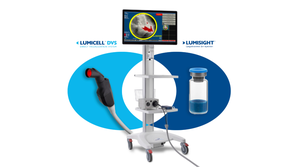St. Jude Medical's medical director defended the nearly $18,000 price tag on the CardioMEMS heart failure monitoring system and accused payers of trying to hinder adoption and drive down the cost.
October 7, 2015
Jamie Hartford

St. Jude Medical hails its CardioMEMS HF System as way to reduce hospital admissions and improve the quality of life for patients with moderate heart failure, but critics have charged that the device is too expensive. Today at the AdvaMed 2015 conference in San Diego, the company�’s new medical director and vice president of medical affairs fired back.
Phillip Adamson, a cardiologist and heart failure specialist who joined St. Jude in April, defended the nearly $18,000 average sales price of the CardioMEMS system, which uses an implantable sensor and external transmitter to measure and monitor changes in pulmonary artery pressure that can indicate worsening heart disease.
“I think the criticism kind of melts away when you put it into the incremental cost effectiveness ratio as well as quality adjusted life years saved, and it's well within what we call appropriate for costs in the United States—even when we use the antiquated $50,000 per (quality adjusted life) year, which is 1970s dollars of dialysis, I mean, how silly is that,” he said.
Adamson said the cost of the various components that make up the CardioMEMS system—including sensors, IT support, and a cell phone connection for every patient that uses the device—as well as the company’s R&D investment justify the price.
“Those costs are hard to put a number on,” Adamson said.
He also tossed a barb at insurers, who he seemed to blame for the criticism of CardioMEMS’s cost.
“We feel that that’s an issue that payers bring up to sometimes to squelch adoption or to try to artificially drive down the cost,” Adamson said.
A draft report released last month by the Institute for Clinical and Economic Review (ICER), a nonprofit organization that evaluates evidence on the value of medical treatments, called the evidence supporting CardioMEMS “insufficient” due to the uncertainty surrounding factors such as the system’s mortality impact; lack of comparison to a strict, rigorous heart failure management regimen; and the fact that it was evaluated with only a single 550-patient trial. The ICER report also suggested a “value-based price benchmark” of $7,622 would be more appropriate for CardioMEMS based on its cost-effectiveness and budget impact. Analysts, too, have raised concerns about the cost of the system, citing reimbursement and the upfront investment required to implement the system as barriers to adoption.
Still, Adamson, who earlier this year presented study results showing the incremental cost-effectiveness ratio achieved with CardioMEMS at $30,167 per quality adjusted life year gained, insisted that the cost of the device is justified.
“This is a very defensible price; it’s certainly one that fits well within all of the healthcare economic evaluations that are typically done for new things,” he said.
More broadly, Adamson said new medical technologies don't come cheap.
"Innovation is going to be costly . . . keeping people alive is the costliest thing we can do," he said. "I mean, allowing them to die is the cheapest approach, and so if we want innovation, we have to be willing to pay for that innovation.”
Jamie Hartford is MD+DI's editor-in-chief. Reach her at [email protected] or on Twitter @MedTechJamie.
You May Also Like


